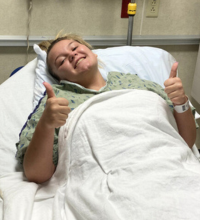Adolescent Bariatric Surgery Program addressing teen obesity
07/06/2023
Chloe Hansher lost nearly 70 lbs., dropping from a size 16 to a size 4. The 16-year-old Litchfield Park resident said she’s grateful for the bariatric procedure that has changed her life. Hansher, like other teens in Arizona, has struggled with obesity and the health and mental issues that can occur as a result.
Hansher underwent surgery just before her freshman year of high school, a pivotal life event for most teenagers.
Although not for everyone, bariatric surgery can be one of the most effective ways of treating adolescents who struggle with obesity. The Fulton Family Foundation, chaired by longtime Valley homebuilder and philanthropist Ira A. Fulton, made a $5 million gift to establish the Adolescent Bariatric Surgery Program at Banner – University Medical Center Phoenix. This gift marked the Fulton Family Foundation’s second investment in obesity care and research in partnership with Banner – University Medicine. In 2018, Mr. Fulton endowed the Ira A. Fulton Clinical Chair in Bariatric Surgery and Metabolic Disorders with a $2 million gift. Since its inception three years ago, physicians have performed more than 20 successful adolescent bariatric surgeries. Hansher was their first patient who underwent the procedure in January 2020.
“It was just a whole new life from the first week that I was out of the hospital,” Hansher said. “I’m so much more social now because I’m comfortable in myself - I’m not self-conscious anymore.”
According to the State of Childhood Obesity and Centers for Disease Control and Prevention, about 14% of children ages 10 to 17 in Arizona are obese, and almost 15 million children and adolescents are affected in the United States. Children and adolescents who are obese are at an increased risk of developing conditions such as type 2 diabetes, sleep apnea, hypertension, and fatty liver disease, as well as mental health issues. Like other health conditions, obesity also disproportionately affects communities of color and those of low socioeconomic status.
“My mental health is better now, especially as a teenager, after going through the surgery — it's a lot easier when you’re comfortable in your own skin.” Chloe said.
Dr. Farah Husain, division chief of Bariatric and Metabolic Surgery at Banner Health, said patients like Hansher have a lower risk of later developing health complications after undergoing bariatric surgery.
“While diet and exercise are crucial to health and wellness, they seldom yield significant weight loss results,” Husain said. “Our comprehensive program also supports patients through psychology and nutrition education to help guide them through their weight loss journey.”
Hansher underwent surgery just before her freshman year of high school, a pivotal life event for most teenagers. After shedding the weight and following new lifestyle changes, she felt more at ease in her ability to live a normal life as a high schooler without having to worry about her body image. She’s planning to attend Arizona State University to pursue a degree in nursing and she’s looking forward to a future without the excess weight.
“It’s definitely a lot of work, but it’s worth it in the end,” she said. “My mental health is better now, especially as a teenager, after going through the surgery — it’s a lot easier when you’re comfortable in your own skin.”
The Adolescent Bariatric Surgery Program is accredited by the American Society of Metabolic and Bariatric Surgery and is also designated as an Aetna Institute of Quality and Optum Center of Excellence. From psychological evaluations and peer-support groups to yearly follow-ups, the program is comprised of countless resources and renowned experts to help young patients stay committed to maintaining a healthy lifestyle. Recently, the program expanded to the new Banner Health Center plus facility in Arcadia, which offers dedicated private spaces for adolescent psychology and education classes and will later implement a comprehensive program for family counseling.

